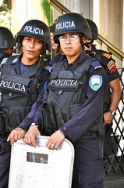Thelma Mejía
TEGUCIGALPA, Nov Honduran police officers. Credit:David Nallah/CC BY 2.0 (Inter Press Service) – Reports of a purported police network in Honduras engaged in murders, extortion, kidnapping, car theft and drug trafficking ompted the government to sack several high-level police officials and ask Congress for help in purging the police at all levels.
Honduran police officers. Credit:David Nallah/CC BY 2.0 (Inter Press Service) – Reports of a purported police network in Honduras engaged in murders, extortion, kidnapping, car theft and drug trafficking ompted the government to sack several high-level police officials and ask Congress for help in purging the police at all levels.
The scandal is the biggest since the late 1990s, when rampant corruption and criminality led to the transfer of control of the police from military to civilian authorities.
National human rights commissioner Ramón Custodio urged the government to declare a state of emergency and seek the immediate clean-up of the police by independent outsiders.
The police force in Honduras is widely seen as a veritable school of crime.
Trade union leader Daniel Durón told IPS he was “frightened by such high levels of criminality among the police…Purging the force is insufficient, I believe; what we need is a new police force.”
Manuel Capellín, director of the Honduran branch of Casa Alianza, an NGO that works with street children in numerous countries, remarked to IPS his strong suspicions that the police were involved in killing young people.
According to the United Nations Office on Drugs and Crime (UNODC) 2011 Global Study on Homicide, released in October, Honduras has the world’s highest murder rate: 82.1 homicides per 100,000 people – up from 37 per 100,000 in 2004. This is compared to a global average of eight per 100,000 population, as reported by the World Health Organisation.
The latest police purge, which involved not only the removal of several police chiefs but also the arrest and investigation of 176 rank-and-file police officers, was triggered by the murder of two National Autonomous University of Honduras (UNAH) students.
One of them was the son of UNAH chancellor Julieta Castellanos.
Rafael Vargas Castellanos, 22, and Carlos David Pineda, 24, were chased by two police cars as they drove home from a birthday party the night of Oct. 22.
The police shot at them and wounded one of the young men, who were forced to pull over. The police then killed them and dumped their bodies in a ravine on the outskirts of Tegucigalpa.
That was the result of the forensic investigation, “which from the start was under our supervision, because of the suspicion that we were not looking at a typical murder by ‘sicarios’ (paid killers), who leave after the murder without bothering to clean up the scene of the crime,” Julieta Castellanos told IPS.
“They were killed by members of a state institution that is supposed to keep citizens safe, and there is apparently an entire network of protection to cover up for them. There is no state here; citizens are defenceless,” she said.
The police reported that the suspects in the crime are eight police officers from the La Granja police station on the south side of the capital, four of whom escaped when they were given the day off by their superiors.
The other four are in prison. The new chief of police, José Ramírez, said a major operation had been mounted to track down the fugitives.
“What we are seeing is a criminal ring that operates within the structures of the police force, and the escape of these four key witnesses only makes me think that there is a cover-up to protect powerful people within the police force itself,” Sandra Ponce, the head of the human rights unit at the attorney general’s office, told IPS.
In another recent case, the local newspaper El Heraldo reported that at least 300 FAL assault rifles and more than 300,000 munitions had gone missing from a military warehouse in the capital over two months ago. However, the missing weapons cache had not been reported to Security Minister Pompeyo Bonilla.
The same paper published reports on what it dubbed “cartels of crime” which, it said, operate from police stations in Tegucigalpa and are involved in extorting businesses and individuals for “protection” money, trafficking drugs, stealing cars, kidnapping and murdering.
To avoid outside intervention, the police announced that they would confiscate the documents from the corrupt police stations and remove the “rotten apples”.
“It’s more frightening to run into five police officers than five youth gang members,” former police chief María Luisa Borjas recently told the local newspaper La Tribuna.
The investigations by the press come on top of the reports of human rights organisations that accuse the police of murdering activists and dissidents in the wake of the June 2009 coup that overthrew then President Manuel Zelaya.
In its final report, the Truth and Reconciliation Commission (CVR) that was set up to investigate the coup and its aftermath found that 20 people had been killed in the repression following the coup, including 12 killed in street protests by the police and military as a result of “disproportionate use of their firearms as well as toxic gases,” and eight others who were apparently assassinated by state agents or “other perpetrators apparently serving the state policy of repression”.
UNAH chancellor Castellanos, an expert on security and governance issues, was a member of the CVR.
On another front, the police are also accused of complicity in the wave of violence waged by large landowners against peasants demanding a piece of land to farm in the northeast region of Bajo Aguán, where 1,000 police and military troops were deployed two months ago by the government of Porfirio Lobo?.
On Nov. 3, Congress amended the country’s laws to eliminate the police internal affairs department and turn over investigations to an independent new body. It also announced reforms to create integral citizen security policies.

